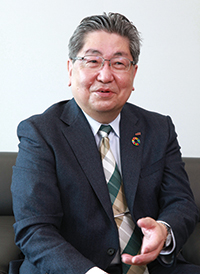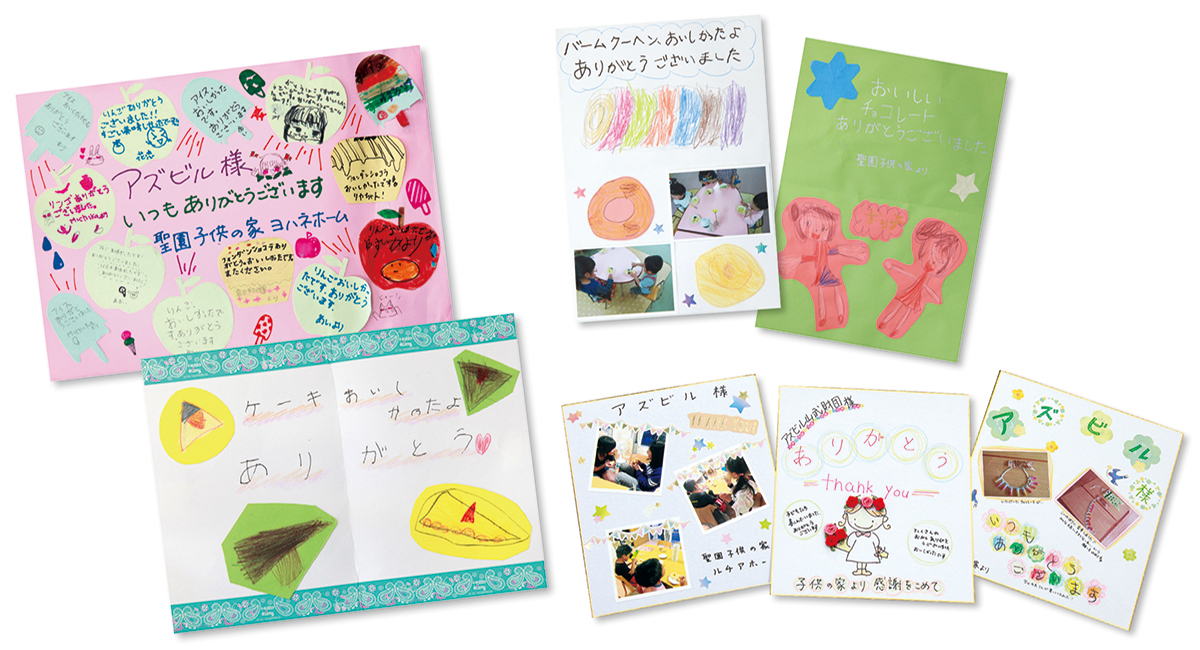Contributing to Society Based on Azbil’s Human-centered Philosophy
Azbil contributes to the healthy development of young people and technological advancement through providing scholarships, supporting education and enlightenment, and subsidizing technical research. The significance of these efforts aligns with the idea of realizing a sustainable society in the SDGs.
The Azbil Yamatake General Foundation was established with the aim of contributing to the sound development of young people and the creation of new technology. Passing on Azbil’s founding spirit of “freeing people from drudgery,” the foundation contributes to society through subsidies and support, with the aim of creating joy and happiness. The significance of these efforts is exactly in line with the SDGs’ idea of realizing a sustainable society.

Hirozumi Sone
Executive Chairperson
Azbil Yamatake General Foundation
- Inheriting founder’s thinking in our DNA and contributing to society in a human-centered manner
- Going beyond financial assistance through face-to-face exchanges
- Active support for attending school, from the perspective of the SDGs
Inheriting founder’s thinking in our DNA and contributing to society in a human-centered manner
The Azbil Yamatake General Foundation was established in 2016 with the aim of contributing to the healthy development of young people—the leaders of the future—and creating new technology, as a commemoration of the 110th anniversary of Azbil Corporation. The name of the foundation, which is based on the former name of Azbil Corporation, Yamatake, reflects the desire to pass on the DNA of Azbil founder Takehiko Yamaguchi, who aimed to free people from drudgery. The work of the foundation rests on three pillars: (1) providing scholarships, (2) supporting education and enlightenment, and (3) subsidizing technological research, all of which is done under the motto “For the future of youth.” Under the azbil Group’s philosophy of “realizing safety, comfort, and fulfillment in people’s lives, and contributing to the preservation of the global environment through human-centered automation,” this program has been acting continuously to give support that leads to the creation of joy and happiness, and to contribute to society in a way that is unique to Azbil.

The foundation’s three support programs
The foundation provides three support programs that express the hope that children will grow up in the future to be straight like a hiba arborvitae tree, which is the foundation’s symbol for this initiative.
Going beyond financial assistance through face-to-face exchanges
The first and second pillars (scholarships; education and enlightenment) are implemented with a focus on the community around the city of Fujisawa (in Kanagawa Prefecture, about 60 km from Tokyo), where the Fujisawa Technology Center, the azbil Group’s research and development base, is located. The third pillar (support for technological research) is implemented nationwide.
Azbil participates in a scholarship program created by Fujisawa to provide opportunities for university-level and other education to young people living in the city who for financial reasons have difficulty receiving an education. Donations from the foundation are used as part of the financial resources of Fujisawa’s education support fund, which was established to fund the scholarships. In addition, with the aim of supporting the education of children from single-parent families who need financial support, a school support system was established in collaboration with Fujisawa City Hall and the Fujisawa Social Welfare Council. The foundation provides support funds for children who go on to junior high school or high school, or who graduate from junior high school and find employment.
The foundation’s education and enlightenment support project helps to fund the Misono Children’s House, which is operated by the Misono social welfare corporation in Fujisawa. In addition to donating to the facility, Azbil provides support for school attendance and for employment when children living in the facility turn 18 and graduate. In addition, for young people who find it difficult to live independently immediately after graduation, the foundation provides support for daily necessities through its facilities.
In addition, since the increased number of school classes conducted remotely due to COVID-19 resulted in a shortage of equipment needed for home learning, Azbil provides computers and tablets to children to create an environment with learning opportunities. Furthermore, Azbil supports the My Own Place student volunteer group, which promotes children’s growth by opening terakoya (Japanese voluntary prep schools) in Fujisawa, cooking meals, and playing with children. With the aim of creating a place for children to belong, this organization is mainly run by students from Keio University, which has a long history in Japan. The foundation actively supports contributions to society by such young people.
Regarding technological research support, the foundation has made donations to the iPS Cell Research Fund of Kyoto University’s Center for iPS Cell Research and Application, understanding the purpose of the center’s activities and aiming to support the development of science and technology that will support the future of Japan and lead to peace of mind of young people and others. Also, starting in fiscal year 2021, the foundation launched a new initiative to provide funding for individuals engaged in research that contributes to human progress and the resolution of social problems. Applicants for a research subsidy are solicited on the foundation website. After a multifaceted evaluation, a total of 10 researchers have been selected in a wide range of technical fields, including measurement and control, regional environmental conservation, and achievement of the SDGs. Each researcher receives a two-year grant.
What the foundation values in this kind of support is face-to-face interactions between people. For example, on Japanese Children’s Day and Christmas, the foundation’s directors visit Misono Children’s House to deliver cakes and other items, and at My Own Place the foundation’s staff provides consulting for students who face problems in their volunteer activities. In the technological research subsidy project, after the subsidy period ends, the foundation expects that recipients will engage in activities such as giving lectures to local youth on the results of the research. In this way, efforts to create an environment in which people can listen to each other face-to-face and discuss problems are a major characteristic of the foundation, which seeks to provide not only financial support but also mental support.

Letters and colored paper given to the Azbil Yamatake General Foundation by the children of Misono Children’s House.
Active support for attending school, from the perspective of the SDGs
Azbil, which supports the foundation’s activities, formulated essential goals of the azbil Group related to the SDGs in 2019, positioned the period up to fiscal year 2030 as a Decade for Action, and is continuing to strengthen these initiatives. As a result, the foundation since 2020 has expanded the scope of its activities by providing financial resources for achieving the SDGs, independent of the three pillars already mentioned. Specifically, in June 2020 it donated funds, earmarked for use in Kanagawa Prefecture, for socially vulnerable families and students, such as single-parent households affected by COVID-19. It also donated to an organization that conducts educational support projects for orphans in Japan, to support students who have missed out on educational opportunities.
Based on donations from Azbil, the foundation intends to continue providing support in the future, while particularly valuing interactions with people. To deepen its contributions to society, the foundation plans to focus on laying foundations. In step with the azbil Group, the Azbil Yamatake General Foundation expects to further expand the regions and areas it supports and to make contributions to society based on Azbil’s human-centered philosophy, while also incorporating the perspective of the SDGs.
This article was published on March 31, 2023.

